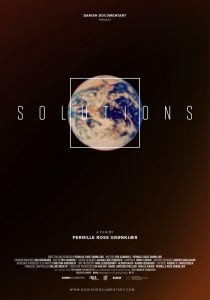
“Solutions”
(Denmark)
Screened at the 30th annual Whitaker St. Louis International Film Festival (3/5)
Coming up with viable solutions to the world’s many ills these days is by no means easy. There are myriad problems, and they’re often interrelated in ways that are difficult to identify, diagnose, quantify and resolve. Issues related to the environment, economics, democracy, inequality, communication and a host of other matters are difficult to address because of this intrinsic interconnectedness. So what do we do? In the days before the pandemic, a 10-day conference was organized involving 20 high-level experts in these and other fields. They met in New Mexico to discuss potential solutions, and this gathering provided the basis of the latest documentary project from Danish filmmaker Pernille Rose Grønkjær. The result is an engaging collection of recorded segments from the group’s sessions, as well as clips from interviews with individual participants, each examining the greatest challenges we face and proposing potential solutions. The film itself is well-organized and clearly defines the issues, providing concise summaries of how we might address them. However, as much as I enjoyed the presentations here, I was somewhat underwhelmed by the content itself. Many of the proposals come across as well thought out but overly intellectualized – Ivory Tower propositions that may well be needed but seem unlikely of ever being implemented for one very basic reason: they do not take adequate account of the impact of the current state of human nature. To believe that everyday citizens of the earth will simply agree with these lofty, principled ideas because experts tell them they should seems wholly naïve, even if they have the potential to rectify things. Without a corresponding change in human nature, no amount of intellectualism – no matter how seemingly well reasoned – is going to get us out of the mess we’re in now. And, unfortunately, the film may offer good ideas but false hopes for getting the job done at a point in our history where time may be running out.




Leave A Comment